Is Fox News really the reason we're all so angry about politics these days? You can read my case for the prosecution here, and then you can read a critique from Dan Drezner here. Dan makes some good points that others have also made, which prompts me to make two points of my own in response.
First, and most obviously, I agree that there are no monocausal explanations for things like this. In particular, I give Newt Gingrich credit for being the godfather of American outrage politics in the early '90s. However, although he may have been first, he sputtered and imploded pretty quickly. It was Fox News that picked up the ball and turned it into a relentless 24/7 money spigot starting around 2000. Similarly, social media has probably made things worse over the past few years—though by less than many people think—but the real rise of outrage politics happened between roughly 2000 and 2015. Clearly social media played no role during that period.

More generally, there were lots of things going on over the past 20 years that played a plausible role in our broken politics. I won't even try to list them all. However, I'm aware of most of them and agree about their odiousness. I just don't think they're the major actors in fomenting political rage over the past couple of decades.
This leads into my second point. Dan says that "elite polarization" far predates the year 2000, and he's right. The wellspring of modern polarization was the counterculture movement of the '60s, with its liberal emphasis on civil rights, gay rights, and feminism. The subsequent switch of Northeast liberal Republicans and Southern conservative Democrats to the opposite party played out over the '70s and '80s and produced the ideologically polarized parties we have today. Robert Bartley played an underappreciated role by turning the Wall Street Journal editorial page—with its highly influential readership—into a take-no-prisoners conservative juggernaut beginning around 1978. Finally, in the early '90s, conservative actors like Rush Limbaugh, Matt Drudge, and Newt Gingrich brought everything together in the sweep of the 1994 election by a cadre of ultra-conservative true believers. From that point on, Republican elites were fully bought into the radicalization of their party. A decade or so later Democrats began to follow suit, though with different factions playing the radicalization role.
This is all a longwinded way of saying that I agree with Dan on this point. But polarization is not what I care about. I care about explaining anger and rage—and while polarization may help that along, it's neither necessary nor sufficient.

To build up rage you need to deliberately and relentlessly feed it. That's what Fox News does, and it's never relied especially heavily on polarization. Rather, it relies on a single-minded dedication to finding and exaggerating things about liberals that are most likely to induce fear and fury in its viewership. That's the battle plan Roger Ailes put in place and that Rupert Murdoch funded: not just conservative advocacy per se, but making liberals into objects of rage. This is the machine primarily responsible for the destruction of American politics over the past couple of decades. Newt Gingrich may have created the blueprint, but it's Fox News that engineered and won the insurgency Gingrich only dreamed of.
So is there anything we can do about Fox News? I think there is, though I suspect that even hardnosed liberals may quail at its incivility. But that's a subject for another post.




